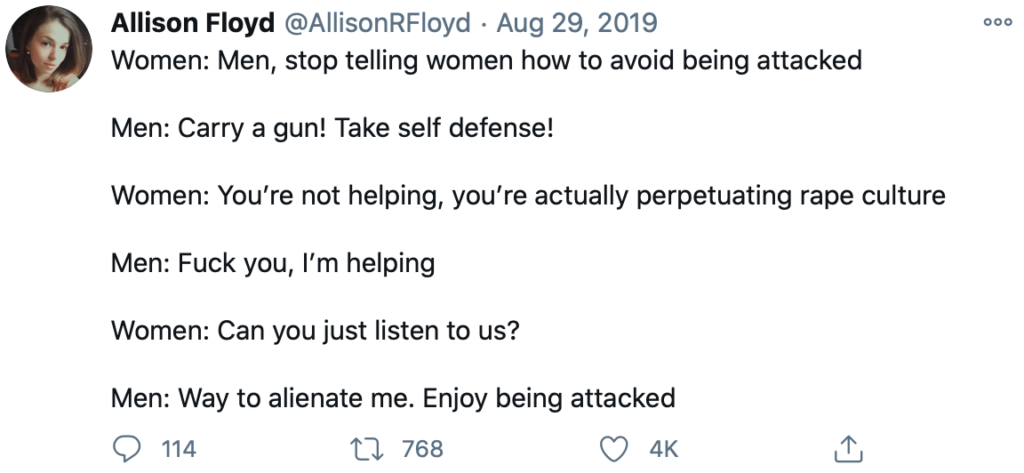People think they have good intentions when they say things like, “We need to teach girls and women to protect themselves from rape.” Far too often, blame is placed on the victim rather than the perpetrator.
What is victim blaming?
Victim blaming is the attitude, culture, and behavior that suggests victims bear full or partial responsibility of crimes that befell on them.
“In my experience, having worked with a lot of victims and people around them, people blame victims so that they can continue to feel safe themselves. I think it helps them feel like bad things will never happen to them. They can continue to feel safe. Surely, there was some reason that the neighbor’s child was assaulted, and that will never happen to their child because that other parent must have been doing something wrong.”
Barbara Gilin, a professor of social work at Widener University
The psychology of victim blaming
A question we must ask ourselves is why are victims the focus of blame when we should really be outraged at a perpetrators behavior/crime? When you take a moment to think about this, logically, it makes sense to place the blame where it’s due: on the perpetrator.
Parents tell their children to tell them if anything sexually inappropriate happens to them. Yet when something sexually inappropriate happens, parents sometimes (subconsciously or not) blame their child and interrogate them with (what can often feel like) judgmental questions.
The police force instills in children to call them when they need help. Yet when children and adults do call them or come in to report a sexual violation, victims are (too often) blamed, not believed, and can be further traumatized.
If a headline read: “Woman befriended a man, then she was raped” statistically, people would be more inclined to blame the woman (the victim) for his actions.
However, if a headline read: “Man befriended a woman, then raped her” statistically, people would be more outraged at the man for what he (the perpetrator) did.
This is why verbiage matters in the media. And to any reporter covering stories of rape and sexual assault, it is so important to be mindful in how you are writing.
Victim blaming also stems from a lack of empathy along with too much focus on victims in the sense that the general public focuses only on what a victim could have done yet neglect to focus on the agency of perpetrators and what they potentially could have done differently.

The taxing messages young girls and women face that contribute to victim blaming culture
Girls and women bare the burden alone when people say the following phrases, especially when these phrases are said only to girls/women and not boys/men:
- Don’t show too much skin.
- Don’t wear that. It’s too revealing.
- Don’t be a prude. Show some skin.
- Carry a gun.
- Be sure to put keys between your fingers.
- Don’t walk alone. Especially at night.
- Take a self defense class.
- Don’t be out late.
- Carry mace. Always.
- Don’t flirt. You’re asking for it.
- Text someone when you’re back home.
- Cover your drinks.
- Have a buddy system.
Moreover, these phrases tend to induce shame, blame and guilt. All of which are never helpful to a victim of harassment or sexual violence.
Instead of saying the phrases above, let’s say this instead:
Don’t show too much skin.- It doesn’t matter how much skin someone is showing. He/she could be naked and it would still never warrant anybody to touch someone inappropriately.
Don’t wear that. It’s too revealing.- Wear what makes you feel comfortable and what makes you feel your best. You are not responsible for other people’s actions.
Don’t be a prude. Show some skin.- You are not responsible for pleasing someone else in how they think you should dress.
Don’t flirt. You’re asking for it.- Be yourself. Even if you are flirting, your “no” is to be respected every time and at any time.
The following messages require parents, schools, systems, etc. to put the focus on perpetrators’ behavior to change the narrative. For example, men (in general) love to offer advice to women about carrying a gun to protect themselves instead of listening to women’s experiences and finding ways to actively be part of the solution to reduce victims.

Carry a gun.Be sure to put keys between your fingers.Don’t walk alone. Especially at night.Take a self defense class.Don’t be out late.Carry mace. Always.Text someone when you’re back home.Cover your drinks.Have a buddy system.
In general, we need to get used to saying phrases that puts the onus on perpetrators instead:
Perpetrators need to be held to account and we need to stop only teaching young girls and women to be safe, but also teach boys (and girls) to not be sexual predators.
How do you think we can shift the blame? Leave comments or questions in the comment section below. (Harassing, blameful and/or rude comments will not be approved or tolerated.)



